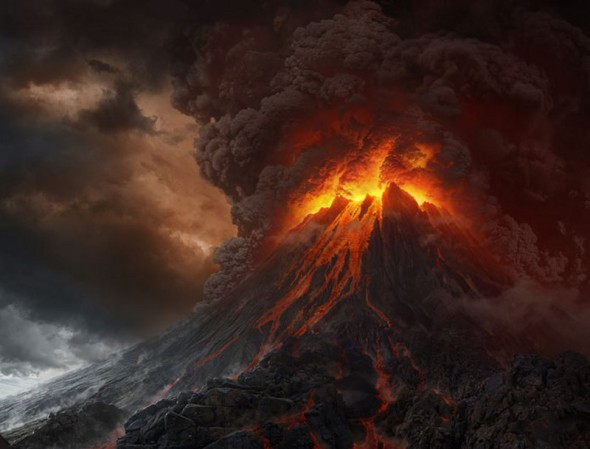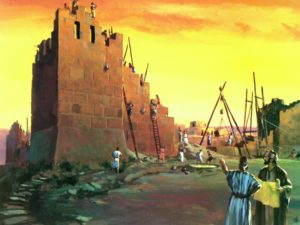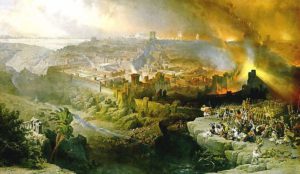Lesson 3 provided a brief summation of God’s redeeming Israel in the Red Sea. On the other side of the Red Sea there was a vast wilderness. Israel would journey through this wilderness for 40 years before arriving at the land God promised Abraham. Lesson 4 is here to detail what you need to know about the Wilderness Period.
Introducing the Wilderness Period
This period spans Exodus 16 to Joshua 2. The majority of Exodus, Leviticus, and Numbers actually all take place at Mt. Sinai where God made His covenant with Israel (see Exodus 19 – Numbers 10). The establishment of the covenant at Mt. Sinai is the single most important event within this period, and it stands at the center of everything that occurs from Exodus 16 to Joshua 2. This Sinai covenant continues two story lines from Genesis: 1) Adam being created in the image of God and 2) Abraham being chosen to bless the whole world.
1. In the Image of God
After three months of marching in the wilderness, Israel arrived at Mt. Sinai where God was to enter into covenant union with them. Review Lesson 2 for a review of covenants, their construct and significance. Moses ascends Mt. Sinai to receive these words from God, “If you will indeed obey My voice and keep My covenant, then you shall be a special treasure to Me above all people; for all the earth is Mine. And you shall be to Me a kingdom of priests and a holy nation,” (Exodus 19:5-6). In this statement, Israel is being selected from among all the nations of the world to be holy (set apart) to God. This passage and others (Exodus 32:11-12 & Deut. 9:27-29) teach that Israel was chosen by God to reflect His image to the world. When the surrounding nations saw Israel, their supernatural military might, their strict moral uprightness, and their sacrificial worship, they would respond like Moses’ father-in-law who proclaimed, “Blessed be the Lord…now I know that the Lord is greater than all the gods!” (Exodus 18:10-11). This mission of reflecting God’s holy image to the world is the same mission Jesus gave to His kingdom people in Matthew 5, “Let your light so shine before men, that they may see your good works and glorify your Father in heaven,” (v. 16). This image bearing mission did not start with Israel. Remember, the Bible is a single, developing story.
“And God made the beast of the earth according to its kind… Then God said, ‘Let Us make man in Our image, according to Our likeness; let them have dominion over…all the earth,” (Gen. 1:25-26)
Notice the similarities between God’s selecting mankind as special over all the other creatures of the earth and God’s selecting Israel as special over all the nations of the earth. There was something distinctly different about Adam and Israel, and there is supposed to be something distinctly different about God’s kingdom people today. This is one underlying theme that weaves all scripture together- God’s special people of all ages exist so that they might reflect the holy characteristics of God to the rest of creation. When studying Exodus 19 – Joshua 2, pay attention to the emphasis placed on God’s holiness and statements such as, “Be holy, for I am holy,” (Leviticus 11:44). The layout of Israel’s camp, the arrangement of the tabernacle, the priesthood, and all the moral or ceremonial laws found in Exodus, Leviticus, Numbers, and Deuteronomy are designed in such a way that reflects God’s holy image in every facet of Israel’s existence.
2. Abraham, Isaac, and Jacob
Recall the covenant God made with Abraham in Genesis 12:1-3, the blessing that He then extended to Isaac and Jacob. The blessing included four major components: 1) Great Land 2) Great Nation 3) Great Name 4) Great Blessing to all the earth. Exodus 2:4 starts out the story of Israel as a nation with these words- “So God heard their groaning, and God remembered His covenant with Abraham, with Isaac, and with Jacob.” From the outset, the Holy Spirit reveals the covenant blessings of these patriarchal fathers are continued through the nation of Israel, though Israel does not actually become a formal nation until God announces His covenant in Exodus 19 and inaugurates that covenant in Exodus 24. Many times throughout the Wilderness Period, Moses refers back to the covenant God made with the forefathers (i.e. Exodus 32:13; 33:1; Lev. 26:41; Num. 32:11; Deut. 1:35; 9:27). When establishing the covenant at Mt. Sinai, God even calls Israel “the house of Jacob” (Ex. 19:3) in order to bring to remembrance the same covenant God made with Jacob. Why does this even matter you ask? This detail is evidence that the story begun in Genesis is still at play till at least Joshua 2. Looking ahead, we find this story is still at play, and the covenant blessings are still yet to be fulfilled in their spiritual sense until after Jesus has come and died (see Acts 3:25-26). This last point is highly problematic for those who still hold on to Judaism and Christians who believe in a physical 1,000 years reign in Jerusalem at the end of this age.
Conclusion– There is no earthly way to cram everything pertinent to understanding the Wilderness Period into a single Five Minute Bible Study. You have learned the central point of this period by reading this study. Next week log on to read Part 2 as Five Minute Bible Study gives what you need to know about God’s testing Israel in the wilderness and the conditions He gave for remaining His covenant people.



